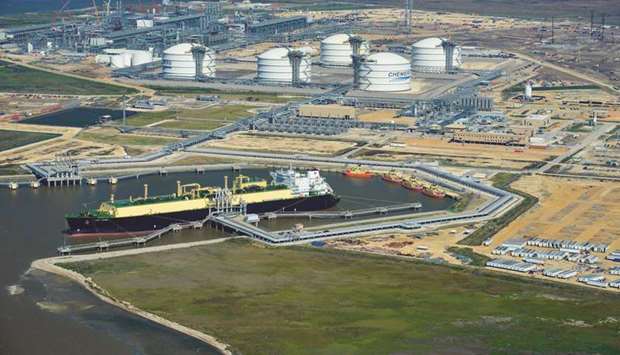A buyer of liquefied natural gas has cancelled two cargoes from Cheniere Energy Inc, the biggest US exporter, as a glut pummels prices for the fuel and threatens to shut a key outlet for shale production.
Spanish utility owner Naturgy Energy Group SA has decided not to take delivery of two shipments from Cheniere, according to people with direct knowledge of the matter. The cargoes, one of which was scheduled for April delivery, were rejected by Naturgy’s clients Repsol SA and Endesa SA, who had originally purchased the volumes from Naturgy and will now pay a contractual fixed fee, the people said.
Cancellations of US cargoes were closely watched and highly anticipated amid a grim outlook on global prices. It could be an early sign that global oversupply is poised to hammer the US gas market, which is already straining under the weight of a domestic glut. Prices in Europe and Asia collapsed as storage levels rose during a mild winter, making it tougher for LNG buyers to make a profit reselling US cargoes abroad.
The coronavirus outbreak in China is stifling LNG demand from the world’s fastest-growing importer. While the Asian nation hasn’t directly imported any US cargoes in more than a year amid trade tensions, the virus has contributed to the global price rout.
The virus has wreaked havoc on commodity markets from LNG to copper while disrupting global industrial production, travel and supply chains. As Chinese demand for the fuel declined, PetroChina Co is said to have delayed discharge of multiple cargoes. The world’s biggest LNG trader, Royal Dutch Shell Plc, said they’re working with customers to reschedule or reroute deliveries. While lower prices are opening up demand in places such as India and Turkey, they’re also testing Europe’s ability to absorb extra supply in a weak market.
“We are seeing supply reduction before demand maximization in Northwest Europe,” said Verena Viskovic, an analyst at BloombergNEF. Even with European benchmark Title Transfer Facility prices crashing more than a fifth since the start of the year, those TTF levels still “are not low enough to fully maximize lignite-to-gas switching,” she said.
At current forward prices of US and European gas, the profit margins of delivering US LNG to Europe and to Asia are thin, according to a BloombergNEF noted last week. Exporters of US LNG may be forced to keep gas at home during the next seven months despite the potential demand in the German power sector.
At least two Japanese buyers are also considering cancelling cargoes from the US that they had expected to load before summer, according to traders with knowledge of the matter, adding that no final decisions have been made.
LNG exports have been a relief valve for US gas producers as output from shale basins soars to record highs. In the Permian Basin of West Texas and New Mexico, where gas is extracted as a byproduct of oil drilling, prices have slid below zero amid pipeline bottlenecks; that means producers are paying others to take their supply.
More gas-fired power plants would have to be built in the US and abroad to ease the current supply glut, said Campbell Faulkner, chief data analyst for commodities broker OTC Global Holdings.
LNG cargoes cancelled as virus compounds export glut in US

Related tags :


